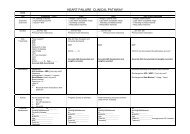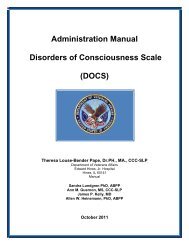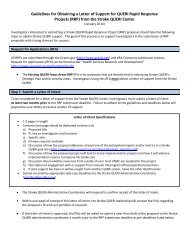The Veteran Supported Education Service Treatment Manual: VetSEd
The Veteran Supported Education Service Treatment Manual: VetSEd
The Veteran Supported Education Service Treatment Manual: VetSEd
You also want an ePaper? Increase the reach of your titles
YUMPU automatically turns print PDFs into web optimized ePapers that Google loves.
Managing Crisis and Emergency Situations<br />
<strong>VetSEd</strong> supervisors serve an essential role in preparing peer <strong>VetSEd</strong> providers to manage<br />
crisis and emergency situations that occur while providing <strong>VetSEd</strong> services. Several<br />
strategies can be used to foster such preparation. <strong>The</strong>se include: a) developing emergency<br />
plans; and b) reviewing the additional VA training materials related to crisis and<br />
emergency management.<br />
Emergency Planning<br />
Peer <strong>VetSEd</strong> providers will be better prepared to respond to the emergencies experienced<br />
by <strong>Veteran</strong>s enrolled in <strong>VetSEd</strong> if they have created example emergency plans in<br />
advance. It is recommended that the <strong>VetSEd</strong> supervisor and peer provider discuss and<br />
create emergency plans for the more common emergencies including suicidal/homicidal<br />
ideation, loss of housing/homelessness, alcohol and/or drug slips or relapses and loss of<br />
contact with <strong>Veteran</strong> after many attempts to follow-up.<br />
Emergency Plan Example<br />
During initial supervision meetings with the peer <strong>VetSEd</strong> provider the <strong>VetSEd</strong> supervisor<br />
may address experiences with emergent situations like suicidal or homicidal ideation, as<br />
well as, establish a plan in the event that either should occur. For instance, the following<br />
plan may be agreed upon:<br />
In the event that a <strong>Veteran</strong> indicates that s/he is suicidal with a clear plan or definite intent,<br />
the <strong>VetSEd</strong> clinical supervisor should be notified and the <strong>Veteran</strong> should be escorted to<br />
his/her current therapist, if possible. If his/her therapist is unavailable, the <strong>Veteran</strong> should<br />
be escorted to the walk-in mental health clinic to be seen by the next available clinician.<br />
<strong>Veteran</strong>s should not be left alone during this time. <strong>The</strong> peer <strong>VetSEd</strong> provider should stay<br />
with the <strong>Veteran</strong> until they are able to see a mental health clinician for evaluation. <strong>The</strong><br />
peer <strong>VetSEd</strong> provider should also remind <strong>Veteran</strong>s of emergency contact options<br />
throughout the <strong>VetSEd</strong> process as well as during emergency situation. Examples of<br />
emergency contact options include: current VA therapist (during business hours)/ walk-in<br />
mental health clinic, 911, and the 24-hour National <strong>Veteran</strong> Crisis Line, 1-800-273-8255<br />
(TALK).<br />
In the event that a <strong>Veteran</strong> indicates clear intent and a definite plan to harm a specific<br />
person, the <strong>VetSEd</strong> supervisor should be notified and the <strong>Veteran</strong> should be directed to<br />
his/her current therapist, if possible. If his/her therapist is unavailable, the <strong>Veteran</strong> should<br />
be escorted to the walk-in mental health clinic to be seen by the next available clinician.<br />
VA police and/or local police and the targeted person may also need to be notified to<br />
168<br />
ensure<br />
| P<br />
that<br />
a g e<br />
safety of all involved.<br />
*Plans may need to be modified in order to accommodate each facility.
















